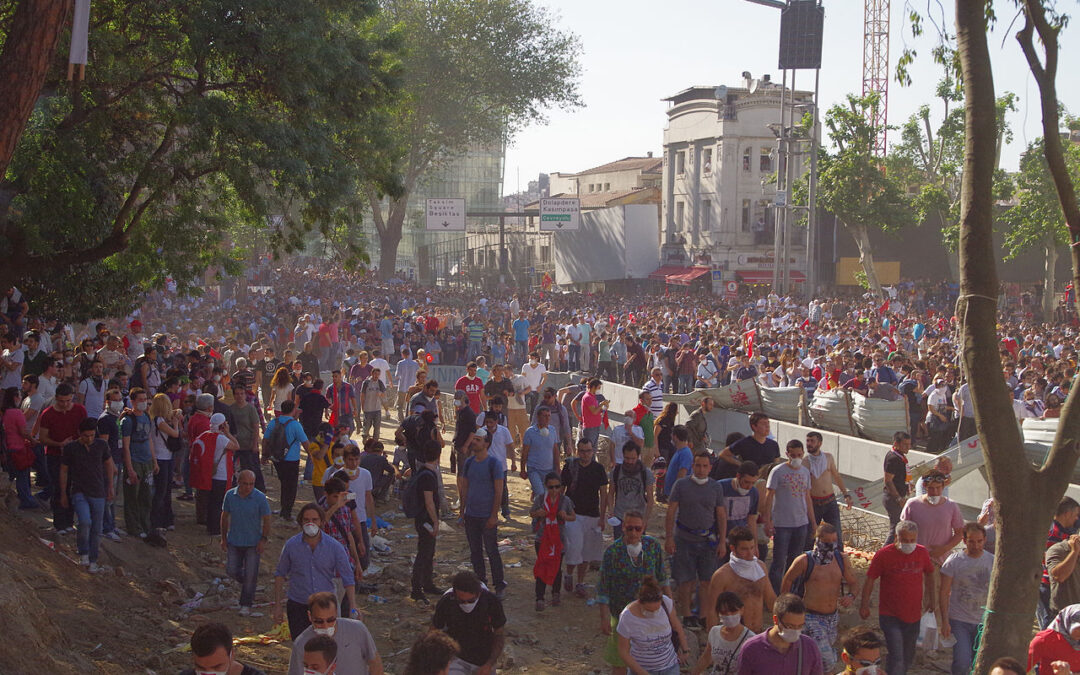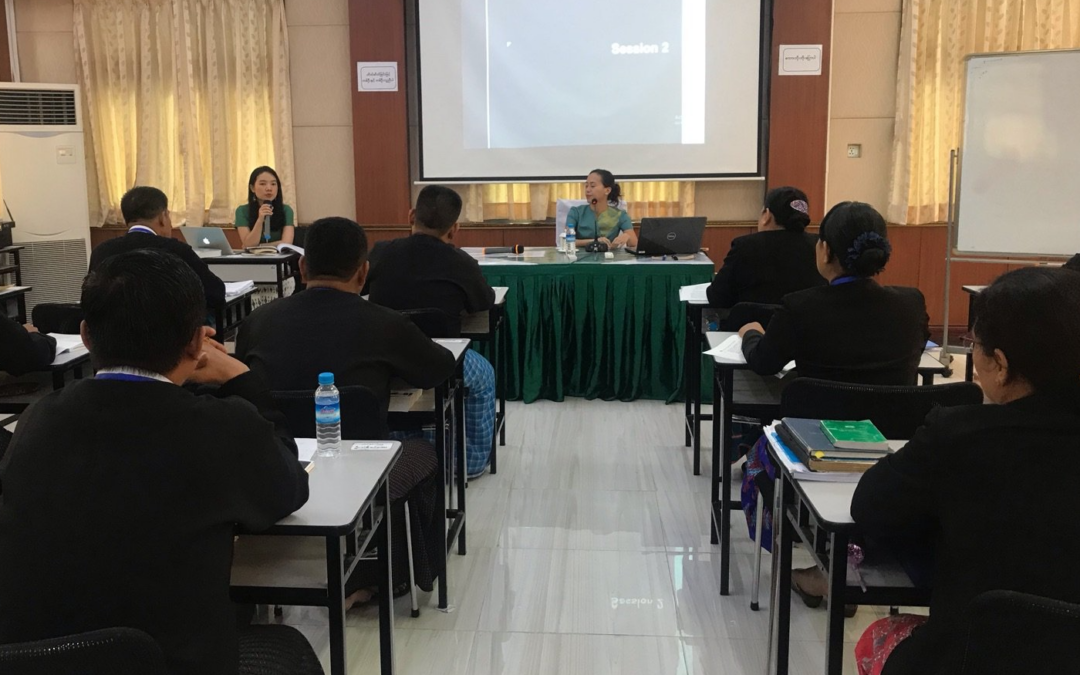
Oct 8, 2019 | News
The ICJ and the International Bar Association’s Human Rights Institute (IBAHRI) have jointly sent an international observer to attend the third hearing of the criminal trial on the “Gezi Park” protest at the Silivri Prison Courthouse in Istanbul, scheduled to take place on 8 and 9 October 2019.
The ICJ and IBAHRI observer will be monitoring a trial hearing before İstanbul 30th Assize Court with prinicipal defendant Osman Kavala, and 15 others; Ali Hakan Altınay, Ayşe Mücella Yapıcı, Ayşe Pınar Alabora, Can Dündar, Çiğdem Mater Utku, Gökçe Yılmaz, Handan Meltem Arıkan, Hanzade Hikmet Germiyanoğlu, İnanç Ekmekci, Memet Ali Alabora, Mine Özerden, Şerafettin Can Atalay, Tayfun Kahraman, Yiğit Aksakoğlu and Yiğit Ali Ekmekçi.
The observer will report directly to the IBAHRI and ICJ Secretariats on the proceedings following the mission.
The Gezi Park protests began in May 2013 as an effort by a group of environmentalists to save a park in central Istanbul from being rezoned, but soon turned into nationwide demonstrations.
The protest was quelled by police with the use of tear gas and water cannons against the protesters in Taksim Square. Following a six-year investigation into the events, the 657-page indictment issued by the Istanbul Chief Public Prosecutor’s Office was accepted by the 30th A Court in Istanbul on 4 March 2019.
The defendants are to be charged under Turkish Criminal Code Article 312 (attempt to overthrow the Turkish Government or attempt to prevent it from fulfilling its duties), Article 151 (damage to property), Article 152 (qualified damage to property), Article 174 (possession or exchange of hazardous substances without permission), Article 153 (damaging places of worship and cemeteries), Article 149 (qualified robbery), Article 86 (intentional injury); crimes under the Law on Firearms, Knives and Other Tools no. 6136, and crimes under the Law on Protection of Cultural and Natural Assets no. 2863.
The total sentence asked for by the prosecution for these offences amounts to approximately 47,520 years imprisonment.
Contact:
Massimo Frigo, Senior Legal Adviser, t: +41 22 979 38 05 – e: massimo.frigo(a)icj.org

Sep 8, 2019 | News
At a training event for senior prosecutors hosted by the Union Attorney General’s Office (UAGO) on 7 September 2019 in Yangon, Nay Pyi Taw, the ICJ made presentations on the international standards and legal obligation on unlawful killings.
Representing each of Myanmar’s 14 states and regions, some 30 law officers attended the activity, which was a capacity-building training hosted by the UAGO. This is part of the ICJ’s ongoing engagement with authorities in Myanmar as well as in neighboring countries on the Minnesota Protocol on the investigation of potentially unlawful death (the Minnesota Protocol).
The Minnesota Protocol provides guidance on the State’s implementation of its duty under international law to investigate potentially unlawful killings, including when State actors may have been involved. It applies to deaths under custody, suspicious deaths, and enforced disappearances. Myanmar has experienced widespread incidents of such deaths, including in recent years those constituting serious crimes under international law.
ICJ Associate Legal Adviser, Jenny Domino, introduced salient points of the Minnesota Protocol and shared relevant examples from experience promoting and protecting human rights in the Philippines. She highlighted the significance of the State’s duty to investigate potentially unlawful killings in upholding the right to life under international human rights law.
ICJ Legal Researcher, Ja Seng Ing, shared the case of Laotian activist Sombath Somphone, who was subjected to enforced disappearance on 15 December 2012 with the apparent consent or acquiescence of State agents. To date, Laotian authorities have failed to conduct effective investigations with a view to revealing the fate or whereabouts of Somphone. ICJ has repeatedly called for accountability on the issue.
Participants discussed these cases in relation to the comparative remedies and practical challenges related to the conduct of investigations in Myanmar, where police and prosecutors both have roles to play in the conduct of investigations.
First published in 1991 and subsequently revised in 2016 under the auspices of the United Nations Office of the High Commissioner for Human Rights, the Minnesota Protocol includes guidelines on conducting investigations to ensure that they are prompt; effective and thorough; impartial and independent; and transparent.
Since December 2017, the ICJ has co-hosted several regional workshops in Asia focused on this topic, with lawyers, academics, and State authorities from Thailand, Cambodia, Nepal, India, and Myanmar attending the events.
See also:
https://www.icj.org/thailand-launch-of-the-revised-minnesota-protocol/
https://www.icj.org/myanmar-reverse-laws-and-practices-that-perpetuate-military-impunity-new-icj-report/

Sep 6, 2018 | News
The ICJ welcomed the Supreme Court’s judgment in Navtej Singh Johar et al v. Union of India and others, which effectively ends the threat to a large segment of the Indian population that they will be held criminally liable for exercising their human rights.
The Court has issued a long-overdue ruling that the criminalization of consensual same-sex relationships under Section 377 violates the Indian Constitution, and is in breach of India’s obligations under international law. This long-awaited judgment testifies to the work of activists and lawyers in India, who have shown the potential of the law to affirm human rights and equality.
“This judgment will not only have an impact in India. Its influence should extend across the world. The ICJ hopes that it will provide an impetus for other countries, especially those of the Commonwealth of Nations, to revoke similar provisions that criminalize consensual sexual relations,” ICJ Asia Pacific Director Frederick Rawski stated.
The Court underscored that provisions of Section 377 contravened international law and standards on equality, privacy, non-discrimination and dignity guaranteed in international human rights treaties to which India is a party. These include the International Covenant Civil and Political Rights and International Covenant on Economic Social and Cultural Rights.
The Court also noted that the Yogyakarta Principles, which address sexual orientation and gender identity in international law, reinforce these protections. This is a vital jurisprudential recognition that LGBTI persons are entitled to full equality, and protection of their rights under India’s Constitutional and international human rights law.
In the judgement, which reverses the December 2013 Koushal decision, the Court held that discrimination based on sexual orientation is a violation of fundamental rights to autonomy, privacy, equality, dignity, and non-discrimination. It underscored that decriminalization of homosexuality is only the first step and that LGBTI persons are entitled to equal citizenship in all its manifestations. The Court also recommended that wide publicity be given to judgment to ensure de-stigmatization of identity through sensitization training on barriers to access to justice faced by LGBTI persons.
“Even a landmark decision by the Indian Supreme Court cannot alone end the discrimination against people based on their sexual orientation or gender identity. It is time for the Indian Parliament to conduct wide-ranging review of existing legal framework, repeal discriminatory laws, and address other gaps in the law that prevent LGBT persons from fully exercising their rights,” Rawski added.
Background
For background, see the ICJ’s July 2018 Briefing Paper on Navtej Singh Johar et al. v. Union of India and Others, and its February 2017 report, “Unnatural Offences”: Obstacles to Justice in India Based on Sexual Orientation and Gender Identity.
Contact
Maitreyi Gupta (Delhi), ICJ International Legal Advisor for India
e: maitreyi.gupta(a)icj.org, t: +91 7756028369

Aug 21, 2018 | News
The ICJ and its Polish Section (ICJ Poland) today expressed their support for the actions of the Supreme Court to defend the rule of law and the independence of the judiciary in Poland, including by recourse to the European Court of Justice (CJEU).
This happened in the face of repeated attack by political figures and authorities.
Preserving and safeguarding the independence of the courts is essential for the protection of human rights in Poland, the organizations said.
The ICJ and ICJ Poland urged the Polish executive and legislative authorities to cease all interference with the conduct of the Supreme Court in the carrying out of its legitimate functions.
The law on the Supreme Court that has led to the forced “retirement” of one third of the Supreme Court, including the President of the Court, Małgorzata Gersdorf, must be repealed and the judges reinstated in office, the ICJ and ICJ Poland stressed.
On 2 August, the Supreme Court of Poland took the welcome step, in accordance with European Union law, of submitting a preliminary ruling request to the Court of Justice of the European Union (CJEU) seeking its interpretation on the compliance of the recent legislation on retirement ages of judges with EU law.
Specifically, the Supreme Court enquired as to the legislation’s compliance with the principle of irremovability of judges and the prohibition of discrimination on grounds of age under Directive 2000/78. The Supreme Court has suspended the implementation of the law during the proceedings before the CJEU.
The ICJ and ICJ Poland condemn the attacks against the Supreme Court by political authorities, including President Andrzej Duda, who claimed that the suspension of the law’s implementation has no legal basis.
On the contrary, the Supreme Court of Poland acted in compliance with its duties under article 267 of Treaty of the Functioning of the European Union to raise a question concerning the interpretation of the Treaties and, in conformity with the case-law of the CJEU, to suspend the application of such measures which may violate the law of the European Union, pending resolution of the question.
The legislation raises serious issues of EU law, both in regard to protection of the rule of law under Article 2 of the TFEU, and in regard to discrimination on grounds of age.
This attack against the actions of the Supreme Court occurs amid a systematic undermining of the independence of the judiciary in Poland by the Polish executive and legislative authorities, which the ICJ, ICJ Poland, and judges of the global ICJ network have repeatedly condemned.
The organizations emphasize that irremovability of judges is one of the main pillars of judicial independence and therefore of the rule of law. An ICJ letter of 11 July 2018, signed by 22 senior judges from all regions of the world, urged the Polish government to act immediately to reinstate the forcibly retired judges in office.

Nov 23, 2017 | Agendas, Events, News
The ICJ delivers today and tomorrow a training for judges on asylum, migration and international human rights law, including non-discrimination, organised by OSCE and the Judicial Academy.
The training, that takes place in the capital Belgrade, will be delivered to judges of all level of jurisdiction of Serbian courts.
It will focus on human rights law related to the entry of migrants, including refugees, to the territory of a State, to the State’s obligations on international protection, the rules applicable to detention of foreign national and their rights, and the prohibition of non-discrimination.
Serbia-Training-MIgrationAsylum-OSCEJA-2017-eng (download the agenda in English)









